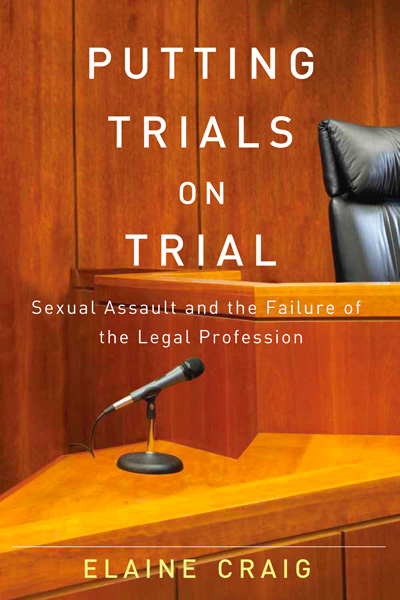Women are more likely to be sexually assaulted during their lifetime than to earn a university degree or be paid the same as their male counterparts.
That was just one insight shared by Schulich School of Law Professor Elaine Craig last week (Sept. 6) before a full house at the Halifax Central LIbraryÔÇÖs Paul OÔÇÖRegan Hall.
 Prof. Craig was there to discuss her new book, , published earlier this year by McGill-QueenÔÇÖs University Press.
Prof. Craig was there to discuss her new book, , published earlier this year by McGill-QueenÔÇÖs University Press.
ÔÇ£The criminal justice system, warts and all, remains the single most significant societal response to the social problem of harmful sexual behaviour,ÔÇØ said Prof. Craig.
┬áShe pointed out that during sexual assault trials, the complainants are asked to remember and be able to share the intimate details of their personal lives and trauma ÔÇö┬ánot just once, but over and over again, in public, with people they donÔÇÖt know. These women are required to testify for hours, often over several days, in an unfamiliar setting.
ÔÇ£Most painfully, we require them to expose themselves, to be vulnerable, in ways too profound to even capture with words,ÔÇØ said Prof. Craig.
As a profession... too often we are failing in our duty to show sexual assault complainants respect, and we are failing in our duty to protect them from discrimination and abuse. ÔÇö Professor Elaine Craig
The women often take the witness stand without being properly prepared. ItÔÇÖs the failure to consistently prepare, protect and accommodate sexual assault complainants that Prof. Craig addressed in her book, the result of six years of research.
ÔÇ£As a profession ÔÇö as criminal defenders, Crown attorneys, judges, law professors, and law society regulators ÔÇö I would suggest that too often we are failing in our duty to show sexual assault complainants respect, we are failing in our duty to protect them from discrimination and abuse, and we are doing so unnecessarily,ÔÇØ said Prof. Craig.
Putting Trials on Trial provides suggestions to make the criminal trial process less traumatic for complainants without threatening the rights of the accused.
ÔÇ£The recommendations to reduce the trauma of the trial for sexual assault complainants that I identify in this book are achievable,ÔÇØ Prof. Craig told the audience, ÔÇ£and neither the constitution nor our adversarial model of justice create obstacles to making them happen.ÔÇØ
Putting Trials on Trial can be ordered from .

